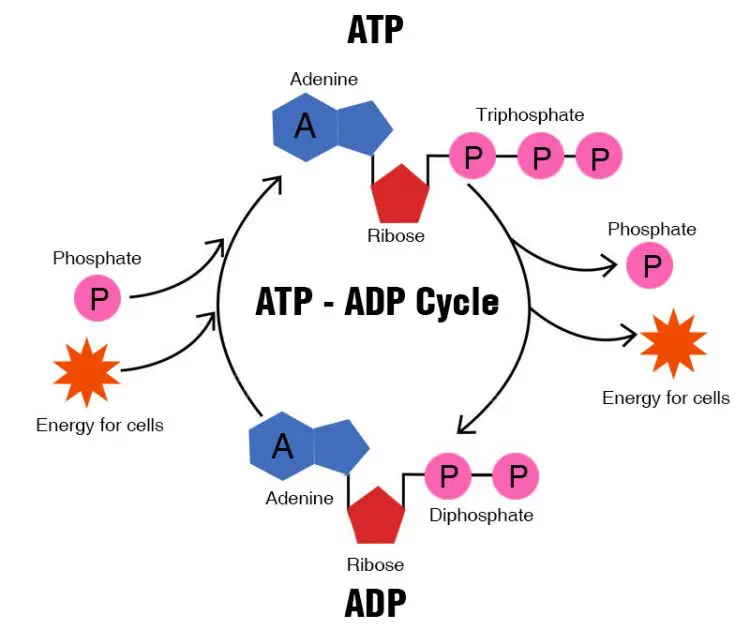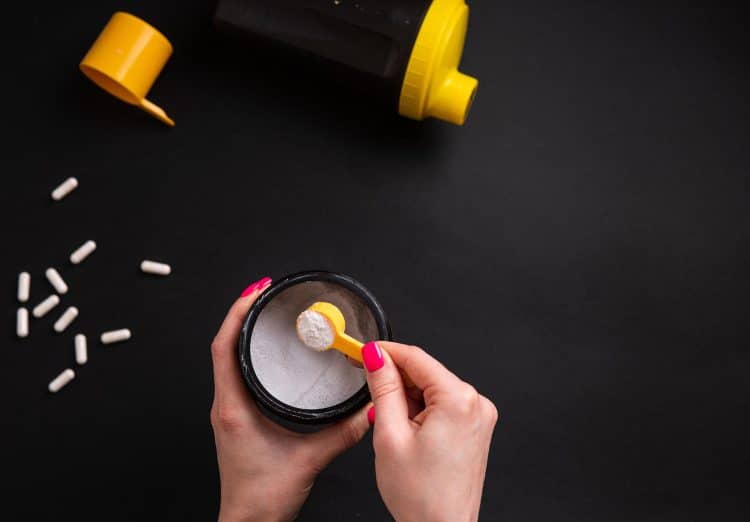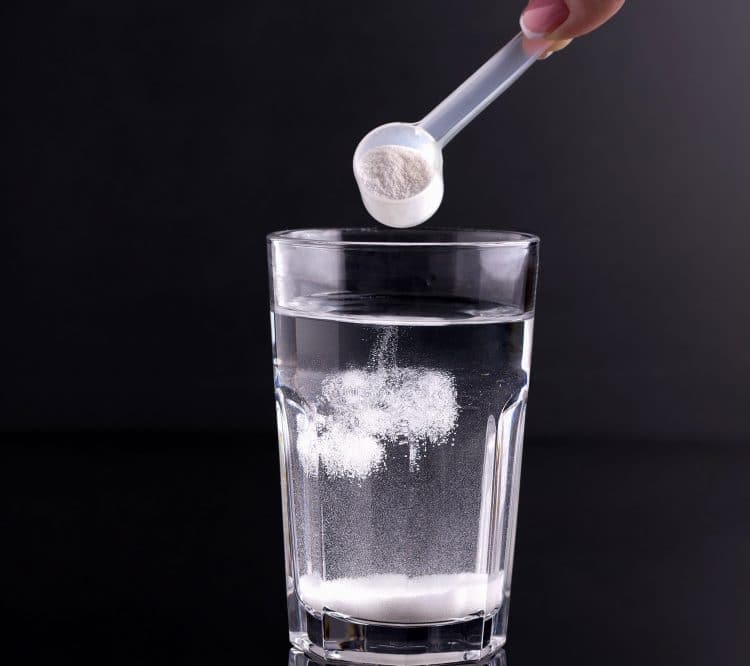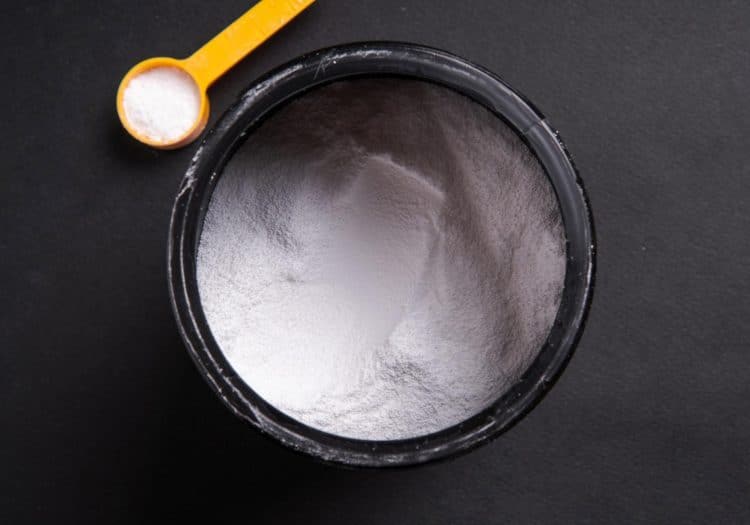Many elite athletes swear by creatine. On the flip side, some advise avoiding being within a 200-meter radius of the supplement. Scientific research, however, has given the supplement the green light.
Creatine is popular among strength sports athletes and fitness enthusiasts. It can help build muscle mass, boost energy, shorten recovery time between sets, and reduce fatigue. Plus, creatine has other health benefits; it can improve brain function, lower blood sugar levels, and aid in fighting other neurological diseases. [1][2][3]
Creatine’s price is so reasonable it makes you do a double-take. Furthermore, the creatine market is cut-throat. Most sports nutrition companies sell the supp around the same price, and value packs make the deal sweeter. Bulk Supplements creatine monohydrate can cost you as low as $0.21 per serving.
Unlike more popular supplements like whey proteins or pre-workouts that deliver 30 servings per container, it’s common for a creatine supp to have up to 200 servings. The higher number of servings makes creatine a convenient supplement. A user could buy a bag of creatine and forget about it for up to six months.
A long-lasting scientifically-proven budget-friendly supplement is every lifter’s dream. Things, however, don’t always go as planned. Many end up with an expired creatine supplement. It could be because of the following reasons:
- Forgetting about taking creatine.
- You buy a new protein, BCAA, or pre-workout supplement containing creatine.
- An unexpected routine change that causes you to stop training.
- You purchased a creatine supplement that was too close to expiry.
Although buying in bulk can save you a lot of money, many people are left asking the same question — “does creatine expire?”
Similar to other health supplements, creatine comes with an expiry date. This article explains if you can use creatine beyond its expiration date and if it can cause health issues.
Check out: Best Creatine Supplements Reviewed & Ranked
What is Creatine?
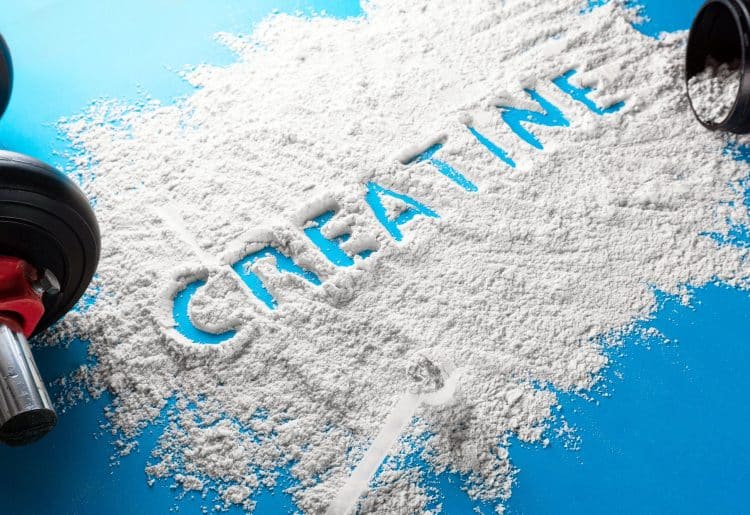
Creatine occurs naturally in muscle cells; it’s also found in red meat and seafood. Creatine is similar to amino acids in its chemical structure and helps build protein. Our bodies can create creatine from the amino acids glycine and arginine in the liver and kidneys.
About 95 percent of the body’s creatine is in phosphocreatine form in the muscles, and the remaining five percent is in the brain and testes. Supplementing with creatine increases your phosphocreatine stores. Phosphocreatine is a form of stored energy in the cells that helps your body produce ATP — a high-energy molecule. A higher ATP reserve can lead to better exercise performance.
Supplementing with creatine can also improve muscle mass, strength, and energy levels and boost brain health.
How Creatine Works
Creatine supplements spike phosphocreatine stores in your muscles, producing more ATP. ATP is your body’s primary source of energy. When your body exhausts your ATP reserves during intense physical activity, it creates more ATP using its raised phosphocreatine stores.
The higher ATP levels shorten your recovery time between sets, which can improve your performance in high-intensity interval training (HIIT) workouts and heavy lifting.
Creatine Dosage
Creatine is produced naturally in the body, and there is a limit to how much creatine can be digested. Most people can only meet 60-85% of their body’s creatine needs through diet. A creatine supplement can help them achieve muscle creatine saturation, ensuring optimal energy production.
There are two ways of taking creatine supplements:
Loading Phase
It requires you to consume 20 grams of creatine daily for 5-7 days, split into four five-gram servings throughout the day. Creatine pulls water into your muscles. Ensure you are hydrated throughout the day to get the best bang for your buck.
Also Read: How Much Water Should You Drink While Taking Creatine?
Maintenance Phase
After completing the loading phase, you must lower your daily doses to 3-5 grams. You can stick with this dosage for a long time, as cycling creatine has no benefits.
On the other hand, you could skip the loading phase and stick to the maintenance phase. It will, however, take 3-4 weeks to maximize your body’s creatine stores and achieve muscle creatine saturation.
Most companies recommend taking 3-5 grams of creatine daily to maximize your creatine stores.
Must Read: Find Your Daily Creatine Intake
Types of Creatine
Creatine’s popularity incentivized sports nutrition companies to develop the supplement in several forms. The six most popular creatine types include:
- Creatine Monohydrate
- Creatine HCL
- Buffered Creatine
- Creatine Ethyl Ester
- Liquid Creatine
- Creatine Magnesium Chelate
Creatine monohydrate is the most popular and studied form of creatine; it is also one of the most basic forms of the supplement. It combines one molecule of creatine and water.
Many lifters complain of creatine monohydrate’s muddy texture and insolubility. Creatine HCL, creatine ethyl ester, and buffered creatine were formulated to fix these issues. Some brands claim these newer creatine variants are superior to monohydrate as they dodge its side effects and do not require a loading phase. Notably, more scientific evidence is needed to prove these claims.
You could also buy different types of creatine in a liquid form. Many believe liquid creatine is easier to absorb, but the claim lacks scientific evidence. Taking creatine in the liquid form, however, hampers its potency.
Although creatine liquids and creatine salts are gaining popularity, they are less thoroughly researched and are considered less stable than powder creatine.
Liquid creatine’s stability and shelf life depend on the solution’s pH and temperature. On the other hand, creatine salts are less stable in solutions as they affect their pH level.
Related: Creatine Monohydrate Vs. HCL: What’s the Difference?
Creatine Shelf Life and Expiry
Does creatine expire?
Yes, it does.
Most creatine supplements have a decent shelf life and come with an expiry date of 2-3 years after production. Creatine monohydrate is the most stable creatine version and can last the longest. On expiry, creatine monohydrate breaks into creatinine — its waste product. After creatine breaks into creatinine, it loses some potency and hampers its benefits. [4]
A review of studies concluded that creatine monohydrate powder started showing signs of breakdown after four years, even when kept at high temperatures of 140°F (60°C). Notably, other creatine forms like liquid creatine and creatine ethyl ester are less stable and can break shortly after passing their expiration dates. [5]
According to an American Medical Association study, many drug companies underestimated a product’s shelf life. The study concluded that, on average, 88 percent of the tested products lasted 66 months past their marked expiry dates. [6]
Related: Should You Dry Scoop Creatine? — Benefits, Risks, & Effectiveness
How to Tell if Creatine Has Expired?
You might notice noticeable differences when your creatine has expired or is nearing expiry. Furthermore, your creatine supplement might lose its potency if you store it incorrectly. Look for these signs to determine if your creatine has gone bad:
- Clumps
- Odor
- Color change
- Foul taste
If your creatine supp develops one of these signs before its expiry date, it’s most likely because you didn’t follow its storage guidelines. Clumping of a creatine supplement could occur because of moisture. Ensure that you do not dip a wet spoon into your creatine tub or leave the lid open overnight.
Creatine that has clumped is safe to consume. Clumping means that several creatine molecules are retaining some water molecules. Clumps could cause creatine to lose potency, depending on the entrapped moisture and the duration of the exposure.
Clumps could also be a sign of bigger trouble. Check for a change in the product’s smell, color, consistency, or taste every time you notice a difference. You should get a new creatine supplement if you notice any irregularities.
Next Read: How Long Does it Take for Creatine to Work?
How to Store Creatine
A change in smell, color, consistency, or taste is likely due to bacteria. Leaving your creatine supplement in unfavorable conditions makes it a breeding ground for bacteria. Storing a creatine supplement under the following conditions will ensure it does not go bad before its expiry date:
- Keep it away from moisture.
- Store it in a cool, dry, and shaded area — preferably in a cupboard.
- Avoid bringing creatine into direct sun exposure as the high temperature can speed up the breakdown.
- Close the lid tightly after every use.
- Keep the silica pad in the creatine tub.
- Store the creatine in an airtight container when planning to take a break from training.
- Ensure you follow any additional storage tips mentioned on the supplement’s tub.
Moisture is creatine’s biggest enemy as it causes the supplement to clump and spur bacteria growth. Keeping it away from water and moisture solves half of your storage problems. Abiding by these seven storage tips can make your creatine supplement last up to four years.
Must Read: How Long Does Creatine Stay in Your System?
Side Effects of Expired Creatine
Creatine is a thoroughly tested supplement and is considered safe. [7]
Most creatine supplements come with a 2-3 year expiry from the production date. Creatine monohydrate is the most stable supplement version and can last up to a year after the expiry date if stored under the right conditions. [5]
After four years, creatine monohydrate starts breaking into creatinine. Creatinine is a less potent version of creatine, and you can consume it without side effects in most cases.
You might notice clump formation in your creatine supplement before the expiry date. Clumps, in isolation, do not signal the creatine supp going bad. Creatine supplements clump when exposed to moisture. Clumpy creatine usually doesn’t lose its potency and is safe to consume.
You should, however, discard your creatine supplement if it develops a foul odor or taste or changes color; these are signs of bacteria development, making the creatine supp unfit for consumption.
Check Out: Does Creatine Supplementation Cause Acne?
Frequently Asked Questions
When does creatine expire?
Most creatine supplements come with a 2-3 year expiry from the manufacturing date. You could, however, safely consume your creatine monohydrate up to one year after the expiry date. We recommend trashing the supp if you are uncomfortable consuming an expired product.
Can you take expired creatine?
Creatine monohydrate supplements can last up to four years before breaking into creatinine. Furthermore, even consuming a creatine supplement that has expired and turned into creatinine will not harm your health.
How long does creatine take to work?
Creatine starts showing its effects after your muscles hit creatine saturation. You should wait at least four weeks before expecting any results.
Wrapping Up
Creatine is one of the most thoroughly studied sports nutrition supplements and is considered safe. A creatine supplement usually has a 2-3 years expiry date from production. Creatine monohydrate is the most stable form of creatine and can last up to four years without losing potency.
The formation of clumps is the most common issue with creatine supplements. It does not signal expiration or hampered potency. On the flip side, if you notice a change in color, pungent odor, or unusual taste, it is best to stop consuming the creatine supp. These changes signal the presence of bacteria. Since a creatine supplement lasts up to four years and doesn’t break the bank, you should consider getting a new tub if you notice irregularities with your supp.
Learn more about Creatine:
- The 5 Supplements Worth Taking (And Another Five That Aren't)
- Creatine Before and After: How Creatine Supplement Affects Your Body
- I’m a Supplement Researcher — These 3 Creatine Forms Will Supercharge Your Gains (and One’s a Total Rip-Off)
- Creatine and Acne: Are You Making This Common Mistake?
- STOP Wasting Your Creatine! The Ultimate Guide to Proper Usage
- How Long Does Creatine Stay in Your System? A Doctor Explains
- What Happens To Your Body When You Take Creatine Every Day For Muscle Gain?
- Creatine + Whey Synergy: The Science Behind This Power Duo's Muscle-Building Magic
References
Fitness Volt is committed to providing our readers with science-based information. We use only credible and peer-reviewed sources to support the information we share in our articles.
- Rawson ES, Clarkson PM, Price TB, Miles MP. Differential response of muscle phosphocreatine to creatine supplementation in young and old subjects. Acta Physiol Scand. 2002 Jan;174(1):57-65. doi: 10.1046/j.1365-201x.2002.00924.x. PMID: 11851597.
- Branch JD. Effect of creatine supplementation on body composition and performance: a meta-analysis. Int J Sport Nutr Exerc Metab. 2003 Jun;13(2):198-226. doi: 10.1123/ijsnem.13.2.198. PMID: 12945830.
- Matthews RT, Ferrante RJ, Klivenyi P, Yang L, Klein AM, Mueller G, Kaddurah-Daouk R, Beal MF. Creatine and cyclocreatine attenuate MPTP neurotoxicity. Exp Neurol. 1999 May;157(1):142-9. doi: 10.1006/exnr.1999.7049. PMID: 10222117.
- Wyss M, Kaddurah-Daouk R. Creatine and creatinine metabolism. Physiol Rev. 2000 Jul;80(3):1107-213. doi: 10.1152/physrev.2000.80.3.1107. PMID: 10893433.
- Jäger R, Purpura M, Shao A, Inoue T, Kreider RB. Analysis of the efficacy, safety, and regulatory status of novel forms of creatine. Amino Acids. 2011 May;40(5):1369-83. doi: 10.1007/s00726-011-0874-6. Epub 2011 Mar 22. PMID: 21424716; PMCID: PMC3080578.
- Lyon RC, Taylor JS, Porter DA, Prasanna HR, Hussain AS. Stability profiles of drug products extended beyond labeled expiration dates. J Pharm Sci. 2006 Jul;95(7):1549-60. doi: 10.1002/jps.20636. PMID: 16721796.
- Kreider RB, Melton C, Rasmussen CJ, Greenwood M, Lancaster S, Cantler EC, Milnor P, Almada AL. Long-term creatine supplementation does not significantly affect clinical markers of health in athletes. Mol Cell Biochem. 2003 Feb;244(1-2):95-104. PMID: 12701816.
Tip: If you're signed in to Google, tap Follow.



